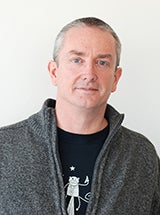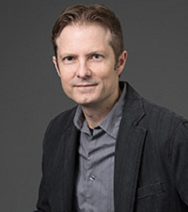2019 SCEP Symposium Archive
Keynote Speaker
Christopher Hunter, Ph.D.
Mindy Halikman Heyer Distinguished Professor of Pathobiology, University of Pennsylvania School of Veterinary Medicine
Penn Institute for Immunology
"Immune responses to Toxoplasma"
Biography
Christopher Hunter is the Mindy Halikman Heyer distinguished professor of pathobiology at University of Pennsylvania School of Veterinary Medicine and a member of the Penn Institute for Immunology. His research areas include infectious disease, toxoplasma gondii, zoonotic diseases, host-pathogen interactions, immunology, parasites, parasitology, transgenic parasites, and inflammatory responses. He received his Ph.D. from the University of Glasgow.
Research Description
The Hunter laboratory has several areas of research that center around understanding how the immune system deals with T. gondii. The first focuses on host pathogen interactions at the cellular level and how the parasite interacts with intracellular signaling pathways (NF-kB/JAK-STAT). In collaboration with the Roos laboratory, genetic approaches are being used to identify parasite factors that are involved in these events. This is part of work in progress which has used transgenic parasites to address fundamental questions about which cells are important in the initiation of adaptive immunity and the role of cross-presentation in the development of T cell responses. These latter studies compliment the work in the laboratory that has helped to define the cytokine networks that regulate the balance between protective and pathological immune responses and current studies focus on the IL-6 family of cytokines in these events. Lastly the laboratory is interested in better understanding the pathogenesis of toxoplasmic encephalitis (TE) in the immunocompromised patients who develop this disease. This work has also led the laboratory to try and apply what we have learned in TE to better understand the neuro-pathogenesis of African sleeping sickness.
Selected Publications
Visit Prof. Hunter's PubMed page.
- Passos, S. T., Silver, J. S., O’Hara, A., Sehy, D., Stumhofer, J. S., and Hunter, C. A. IL-6 promotes NK cell production of IL-17 during toxoplasmosis Journal Immunology 184: 1776-1783, 2010.
- Jordan, K. A., Wilson, E. H., Tait, E. D., Fox, B. A., Roos, D. S., Bzik, D. J., Dzierszinski, F., and Hunter, C. A. Kinetics and phenotype of vaccine-induced CD8+ T-cell responses to Toxoplasma gondii. Infect Immun 77: 3894-3901, 2009.
- Oldenhove, G., Bouladoux, N., Wohlfert, E. A., Hall, J. A., Chou, D., Dos Santos, L., O'Brien, S., Blank, R., Lamb, E., Natarajan, S Kastenmayer, R., Hunter, C., Grigg, M. E., Belkaid, Y Decrease of Foxp3+ Treg cell number and acquisition of effector cell phenotype during lethal infection. Immunity 31: 772-786, 2009.
- Wilson, E. H., T. H. Harris, P. Mrass, B. John, E. D. 5. Tait, G. F. Wu, M. Pepper, E. J. Wherry, F. Dzierzinski, D. Roos, P. G. Haydon, T. M. Laufer, W. Weninger, and C. A. Hunter. Behavior of parasite-specific effector CD8+ T cells in the brain and visualization of a kinesis-associated system of reticular fibers. Immunity 30: 300-311, 2009.
- John, B., Harris, T., Tait, E., Wilson, E.H., Ng, L., Mrass, P., Dzierszinski, F., Weninger, W., Hunter, C.A Dynamic imaging of CD8+ T cells and dendritic cells during infection with Toxoplasma gondii. Plos Pathogens 5: , 2009.
- Anderson, C.F., Stumhofer, J., Hunter, C.A., and Sacks, D. IL-27 regulates IL-10 and IL-17 from CD4+ cells in non-healing Leishmania major infection Journal Immunology 183: 4619-4627, 2008.
- Dzierszinski, F., Pepper, M., La Rosa, D., Wilson, E., Bzik, D., Turka, L., Hunter, CA. and Roos, D. Antigen presentation through MHC class I occurs via the endogenous pathway in non-hematopoietic cells and professional phagocytes infected with Toxoplasma gondii Infection Immunity 75: 5200-9, 2007.
Opening Talk Speaker
Bill Sullivan, Ph.D.
Author and Professor, Indiana University School of Medicine
"The State of the Field"
Biography
Bill Sullivan is a professor at the Indiana University School of Medicine and an author. His Ph.D. thesis at the University of Pennsylvania was on his discovery of genes responsible for drug-resistance in Toxoplasma gondii. He has written for a number of popular science outlets and is an editor and writer at PLOS SciComm, a blog site dedicated to the art of science and medical communication. In 2014, he co-founded my own popular science blog called THE ‘SCOPE, which aims to talk about science in a lighthearted and entertaining way.
He is the author of the book Pleased to Meet Me, Genes, Germs, and the Curious Forces that Make US Who We Are, which was released by National Geographic Books on August 6, 2019.
You can also purchase Toxoplasma merchandise from his website store.
Research Description
The Sullivan Lab studies cellular signaling and the regulation of gene expression in a fascinating protozoan parasite called Toxoplasma gondii. Toxoplasma, a relative of the malarial parasite, causes congenital birth defects, as well as opportunistic infection in HIV/AIDS, cancer chemotherapy, and heart transplant patients. There is also emerging evidence that this parasitic infection may be linked to neurological disorders, such as schizophrenia and behavior modification. While the acute stage of toxoplasmosis can be treated, the ability of the parasite to convert into latent tissue cysts prevents eradication of the infection from the patient. Unfortunately, if immunity wanes, the patient can relapse and suffer additional episodes of life-threatening acute infection. Additionally, Toxoplasma is a serious threat to some wildlife and livestock. We hypothesize that the proteins controlling parasite gene expression at epigenetic, transcriptional, and translational levels may represent novel drug targets to fight Toxoplasma and other infectious diseases.
Selected Publications
See a list of articles and other writings on his website
-
Psychology Today: “Dear Dr. Melfi: Regarding Your Patient, Mr. Tony Soprano…“, 7/8/19
-
The Conversation: “Is the Brain Parasite Toxoplasma Manipulating Your Behavior, or is Your Immune System to Blame?”, 5/14/19
-
PLOS SciComm: “Predatory Publishers Want To Write Your Autobiography!”, 2/11/19
-
A Science Enthusiast: “A Scientist Reviews Products in the ‘Sharper Image’ Catalog, Hilarity Ensues,” 12/19/18
-
PLOS SciComm: “Is It Time for Pre-Publication Peer Review to Die?”, 8/28/18
-
COSMOS: “If Parasites Had Dating Profiles,” 7/20/18 (originally appeared in THE ‘SCOPE 7/18/18)
-
ASBMB Today: “How to Serve up a Killer Research Seminar,” 5/15/18
Southern California Eukaryotic Pathogen Symposium — Oct. 30, 2019
Schedule subject to change
|
8:45 — 9:15 a.m. |
Check-inBadge and abstract booklet pick-up at Genomics Auditorium |
| 9:15 a.m. | Opening remarks for the 9th Annual SCEP Symposium |
| 9:20 — 9:50 a.m. |
Morning Session: Chair, Dr. Meera NairBill Sullivan, Ph.D. - Author and Professor, Indiana University School of Medicine "Transcriptional control of Toxoplasma and Plasmodium" |
|
9:50 — 10:05 a.m. |
Peter Back (Bradley lab) |
| 10:05 — 10:20 a.m. | Bridget Ratitong (Pearlman lab) "Neutrophil regulation of IL-1a secretion in response to Aspergillus fumigatus" |
| 10:20 — 10:35 a.m. | Evelyn Hoover (Lodoen lab) "Toxoplasma gondii induces coagulation in the microvasculature and decreased cerebral perfusion during acute infection" |
| 10:35 — 10:50 a.m. | Thomas Hollin (LeRoch lab) "The role of RNA-binding proteins abundant in Apicomplexans (RAPs) in mitochondrial biogenesis of the human malaria parasite, P. falciparum" |
| 11:00 — 11:15 a.m. | Emily Merritt (Koshy lab) "Do T cells recognize Toxoplasma injected neurons (TINs)?" |
| 11:15 — 11:30 a.m. | Nelly El-Sakkary (Caffrey lab) "Imaging and genomic modalities to drug development for schistosomiasis" |
| 11:30 — 11:45 a.m. | Adam Godzik (CSGID consortium) "Center for Structural Genomics of Infectious Diseases wants to help you to understand the molecular mechanisms of pathogenicity of your favorite pathogen!" |
| 11:45 a.m. — 12 p.m. | Break and squeeze up! |
|
12:00 — 1 p.m. |
Keynote SpeakerChristopher A. Hunter, Ph.D. - Mindy Halikman Heyer Distinguished Professor of Pathobiology, University of Pennsylvania School of Veterinary Medicine Penn Institute for Immunology "Tracking Host Parasite Interactions" |
|
1 — 2:15 p.m. |
Lunch and Poster Viewing (Genomics Breezeway) |
|
2:15 — 2:30 p.m. |
Afternoon Session: Chair, Dr. Karine Le RochSage Davis (Le Roch lab) |
| 2:30 — 2:45 p.m. | Kristina Bergersen (Wilson lab) "Neuregulin-1 attenuates neuropathology associated with chronic Toxoplasma infection" |
| 2:45 — 3 p.m. | Santiago Martinez (Engman lab) "Eflornithine potentiates the action of Benznidazole in two strains of Trypnosoma cruzi" |
| 3 — 3:15 p.m. | Simon Imhof (Hill lab) "Cryo electron tomography reveals novel structural foundations of the 96nm axonemal repeat in Trypanosoma brucei" |
| 3:15 — 3:30 p.m. | Sang-Yong Kim (Nair lab) "Resistin-like molecule alpha (RELM?) regulates inflammation and granuloma formation in intestinal helminth infection through the downregulation of C-C motif chemokines" |
| 3:30 — 3:45 p.m. | Astra Bryant (Hallem lab) "Neural mechanisms underlying temperature-driven host seeking by a skin-penetrating human-parasitic nematode" |
|
4 — 6 p.m. |
Drinks and Nibbles (Genomics Breezeway)Poster Presentation (odd numbers 4:15-5pm; even numbers 5-5:45pm) Announcement of prizes for posters and presentations |

